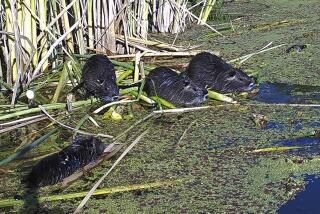Squirrel Crazy : Ventura Beach Rodents Entertain the Crowds, but Critics Call Them a Health Risk
- Share via
VENTURA — They hang back from the beach crowd, sitting casually on the rocks below the concrete promenade that stretches half a mile from Ventura Pier to Surfers Point.
They watch bikini-clad sunbathers with disinterest.
They chew on peanuts.
They act like they own the place.
These are the scrappy squirrels of San Buenaventura, a colony of mangy rodents that has scratched out a comfortable existence on the Pacific shore for as long as anyone can remember.
They are no different than common cinnamon-colored ground squirrels that live in rock outcroppings and dirt burrows throughout Ventura County, except that these rodents have established themselves as a top beach attraction.
Some people think they are cute and cuddly. They feed them sunflower seeds and breakfast cereal, ballooning their already fat tummies.
But others see the squirrels as nothing more than filthy flea-scratching rodents, potential carriers of the plague that should be run off the sand before they brazenly bite someone.
“I don’t like them very much,” said Alex Fisch, a 20-year-old lifeguard from Camarillo. “They are the same thing as rats really.”
Fisch and his partner, Griff Hutton, patrol the stretch of beach where the squirrels hang out. They have had no reports of squirrel-related injuries, they said. But they acknowledge that the rodents are, well, squirrelly.
“You don’t want to get around a pack of them,” said Hutton, a 36-year-old Ventura resident, lowering his voice. “They could chew a man to the bone is what I heard.”
But squirrel fans take issue with such tall tales. They say the bushy tailed creatures are harmless, even shy.
“I don’t think of a squirrel like I would a rat,” said Ventura City Councilman Jim Friedman, who sometimes feeds them peanuts.
“You can’t help but have a certain fondness for squirrels.”
They may have burrowed their way into the hearts of some Venturans, but squirrels’ reputation as troublesome pests is beyond dispute.
*
A camper in San Diego County once complained to park officials about a cat-size squirrel that chewed up his foam ice chest. Aggressive tree squirrels in Yosemite National Park will snatch a French fry right out of your hand.
And in perhaps one of the most widely reported squirrel-related incidents, a squirrel closed the Nasdaq stock market’s computer center in Trumbull, Conn., two years ago after chewing into power lines.
Maybe it is the calming rhythm of the sea that tames the little beasts, but the San Buenaventura squirrels have never created a major problem for local parks officials, they said.
*
There have been no reports of squirrel bites. As a result, there has not been a concerted effort to thin their ranks.
“I have never had any complaints about them,” said Bill Byerts, manager of the city’s parks department and technically the squirrels’ landlord since they live on a city beach.
“There was talk several years ago about limiting the population,” he said. “There was somewhat of an outcry from the people down there who feed them.”
Squirrel lovers may not be aware that it is a misdemeanor to feed animals on parkland. No signs are posted by the promenade warning beach-goers to keep their food to themselves.
“There are certainly a lot of people who walk along the promenade and bring food,” Byerts said.
*
“It is really no different than going up to Sacramento and sitting on a park bench at the state Capitol and feeding the gray squirrels.”
Like their savvy tree-dwelling cousins, the ground squirrels living at the beach have figured out how to work the generous crowds that gather on the beach promenade.
Safely protected by a 3-foot-high wall between the walkway and their rocks, not unlike a barrier at a zoo, the squirrels will perform impromptu shows by chomping on goodies tossed down at them by admirers.
On some days, the squirrels attract as much attention as the surfers pulling hot maneuvers on the waves just a few yards away.
*
Ruth and Bert Memenover have kept a curious, yet cautious eye on the squirrels over the last seven years.
Each summer, the Irvine couple has escaped the inland heat to relax by the beach, and they always stop to peer at squirrels lounging on the rocks.
“We used to sit on a bench down there and people would have peanuts and let them eat them right out of their hand,” Ruth Memenover said.
“I really feel that they were a danger,” she added. “They were all over; it was just covered with them.”
County environmental health specialist Randy Smith said the beach squirrels have received little attention from his agency because they tested negative for bubonic plague several years ago.
Meanwhile, the disease that ravaged Europe during the 14th century killing millions has been found in rodents in rural hillside areas of the county.
Wheeler Gorge Campground north of Ojai has been repeatedly closed after health officials found ground squirrels infected with plague bacteria.
The disease can now be easily cured with antibiotics if the symptoms--inflamed lymph glands, fever and delirium--are recognized and treated in time.
*
But budget cuts have restricted the number of plague tests county biologists can take each year. As a result, officials have concentrated on areas where they have had problems in the past.
Although the beach area does not fall into that category, Smith cautions people to keep clear of the friendly beach squirrels and absolutely not to feed them.
“They do bite, they do scratch,” he said.
“People need to take the general precautions in dealing with wild rodents and that is what they are--wild rodents.”
More to Read
Sign up for Essential California
The most important California stories and recommendations in your inbox every morning.
You may occasionally receive promotional content from the Los Angeles Times.













